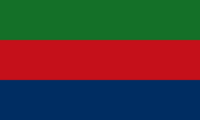Gemotamism
This article is incomplete because it is pending further input from participants, or it is a work-in-progress by one author. Please comment on this article's talk page to share your input, comments and questions. Note: To contribute to this article, you may need to seek help from the author(s) of this page. |
Gemotamism Gemotamim | |
|---|---|
 Flag of the Gemotamist ideology | |
| Ideology | Anti-imperialism Anti-capitalism Anti-clericalism Dirigisme Federalism Militarism National Syndicalism Pan-Buranicism Pan-Dolchism Populism Progressivism Dolchic pan-nationalism Republicanism Socialism |
| Political position | Syncretic Economic: Left-wing to far-left Social: Right-wing to far-right |
Gemotamism, coming from the archaic Stedorian word Gemotam meaning "renaissance", literally "backwards giving birth", is a socialist and Dolchic nationalist ideology that advocates for the creation of a unified federation of nations of Dolchic cultures by means of leadership of government by a Gemotamist-oriented party. The theories are based on the writings and ideas of Falk Jlüter and Paskal Hecker who wrote throughout the late 1930s and 1940s. The late Stedorian military officer and leader of Stedoria, Läkhart Viktor Drejlär, adopted Gemotamism as the official political ideology after the 1971 Stedorian coup d'état which established the Revolutionary Government of the Armed Forces of Stedoria. Gemotamist theory was later further developed by late revolutionary Simon Ulbrikt and current Stedorian Chief Consul Tamäj Köseg, who currently governs Stedoria under such ideology through the National Party of the Stedorian Revolution, which is considered by the Stedorian government to be a branch of the Dolchic Socialist Gemotam Party.
Gemotamism advocates for the development and advancement of Dolchic cultures, values, and societies. Supposedly after an unknown amount of time under the leadership of the Gemotamist ideology, Dolchic nations are to have developed an enlightened and prosperous Dolchic society both economically and socially. Gemotamism promotes the principles of Dolchic nationalism, pan-Dolchism, Socialism, and Progressivism. It is fiercely anti-clerical, and various factions of the DSGP's regional branches support the philosophy of Tikälim, an atheistic-deistic secular religion centred on the belief of reason, to replace religion. Gemotamism supports socialist-oriented economics and expropriations of large companies and monopolies, though still advocates for the existence of private property and entreprises, though with the state taking a leading role in economic development and in industries in an economic system and doctrine known as dirigisme, though Gemotamism refers to dirigisme and socialism interchangeably. For this reason, Stedorian socialism is considered to be a specific idea of socialism, separate to mainstream socialism.
Gemotamism does not mention if these changes should take place by democratic means or through an authoritarian form of governance, making it debated as to if Gemotamism is authoritarian or not. The Revolutionary Government of the Armed Forces of Stedoria, led by Drejlär, was a gemotamist military dictatorship. Furthermore, the Gemotamist administration currently leading Stedoria has been accused of being authoritarian due to its policies against opposition parties, though elections still take place and oppositions parties are permitted to run, though they have met limited success. For this reason, many critics of the ideology accuse Gemotamism as being authoritarian-aligned.